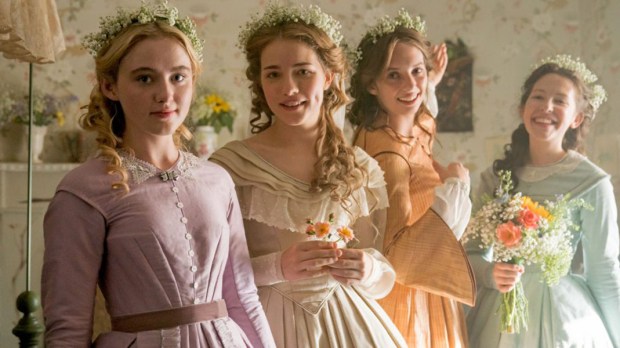I read Little Women when I was an adolescent boy, a time in my life when I basically agreed with Laurie, the boy who lived next door to the March sisters, who says of girls, “You never know what they mean. They say no when they mean yes, and drive a man out of his wits just for the fun of it.” I was mystified by females, and in some ways I still am. To an extent, this mystery is only natural and the diversity of the sexes is one of the great joys of life. We are different, and that difference keeps life exciting.
When Louisa May Alcott wrote Little Women in 1868, it was obvious from the title that the book was focused on the activities of the fairer sex, and yet it was meant to have widespread appeal to all types of readers. To say that it did is an understatement. The novel was a smashing success and continues to be widely appreciated today. It’s been adapted to film several times, most notably in the 1994 version starring Winona Ryder as the tomboyish Jo.
The BBC thinks it’s about time for another re-make. Even though Little Women is proudly American in its sensibilities, the British broadcaster is taking up the challenge and the new version will be screening this January. Based on a first look, it appears as though it will be a fairly faithful adaptation and worth watching.
I’ve now read the book and watched the 1994 movie version and have enjoyed both experiences. This in spite of the fact that, like Laurie, I’m a bit confused by the March sisters. They seem to inhabit a different childhood world than my brothers and I did. We spent our days wrestling in mud pits, obsessing over sports, and riding bikes, while they curl their hair and sing songs together.
With all these differences, can a man enjoy watching Little Women?
For me, the answer is a resounding Yes. Even though Laurie’s tutor, John Brooke, refers to boys and girls as inhabiting “adjoining nations,” and advises to not look too closely into the intricacies of female society, the two males are eventually pulled into the orbit of the women next door. They’re none the worse, or less manly, for it. Laurie serves as the ambassador through whose eyes we come to understand that, in many ways, women are just like men. They laugh, fight, get into trouble, hate school, have hopes and dreams, and are capable of contributing so very much to the world. The story may be about girls, but it’s light-years away from cartoon princesses and sappy romance stories. Each “little woman” has an experience of leaving naive innocence behind, coming into her own, and breaking the constraints of childhood. The themes are truly universal.
The question of men is even addressed in the film when Jo’s writing is declined for publication. The editor tells her that men are not interested in “sentiment” and to submit her work to a ladies journal instead. It’s true in general that men do not like excess sentimentality. However, I don’t know that women like it, either. But to rule out sentimentality doesn’t mean a story cannot show true emotion or deal with serious subjects. Any man who dismisses those ought to re-examine his concept of manhood.
I’ll admit, parts of Little Women challenge me. After a while, all the emotions begin to overwhelm and I’m itching for a killer robot to materialize and shoot lasers out of its eyes. But killer robots are the easy way out of learning to deal with emotions in a serious way. The reward for the effort is worth it, and I’ll confess that I was as invested in being annoyed with Jo for turning down Laurie’s proposal as anyone.
It’s easy to see how some men struggle with these types of stories, though. With so much content on television encouraging us to become alpha males by glorifying violence and tough, anti-heroes, or the current confusion in society about sexual attraction and insinuations about how interest in the arts or dressing well means a man has become too feminine, masculinity is in a bit of a crisis. It’s difficult these days to cultivate a healthy, mature masculinity. So when a movie like Little Women comes along, it can be challenging — What if I watch it and like it? Does this mean I’m not a real man? What would my friends think if they caught me watching Little Women?
There’s a time and a place for everything. Sometimes a man simply needs to toss on some flannel and go chop wood or hang with buddies at the bar for the Big Game. But it doesn’t mean we need to devolve into full-time cavemen. Real men feel emotions, and are sensitive, and get down on the floor and play tea party with their daughters. It takes courage to break the mold, but that is precisely what, as a man, I ought to be willing to do. Life isn’t boys vs. girls and we don’t do ourselves any favors by refusing to enjoy and be challenged by Little Women. The story is a classic for a reason, getting to the very heart of life, the coming-of-age experience, and how a strong family focused on virtue can overcome poverty, sexism, and tragedy to live a life of triumphant joy. I’m a better man for having read it, but more importantly – a better human being.

Read more:
Little Women and Little Men

Read more:
5 Underrated women writers you should be reading

